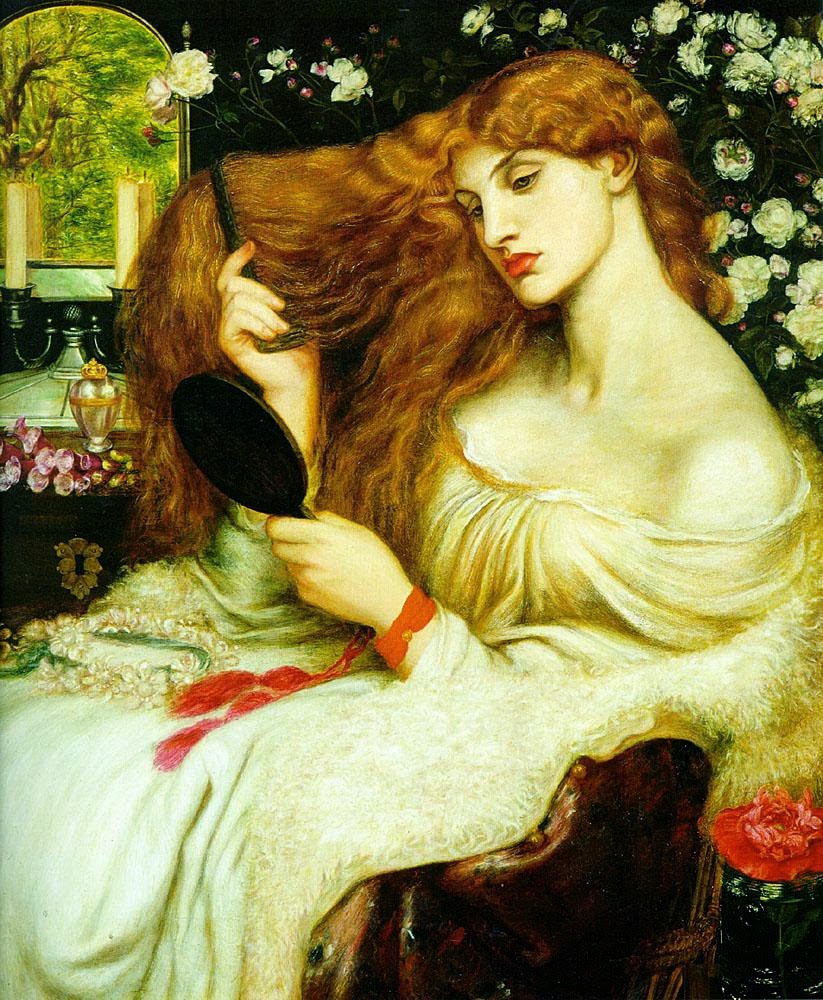SHE: Yet womanhood you reverence,
So you profess!
HE: With heart and soul.
SHE: Of which fact this is evidence!
To help Art-study,--for some dole
Of certain wretched shillings,--you
Induce a woman--virgin too--
To strip and stand stark naked?
HE: True.
SHE: Nor feel you so degrade her?
HE: What
--(Excuse the interruption)--clings
Half-savage-like around your hat?
SHE: Ah, do they please you? Wild-bird-wings
Next season,--Paris-prints assert,--
We must go feathered to the skirt:
My modiste keeps on the alert.
Owls, hawks, jays--swallows most approve ...
HE: Dare I speak plainly?
SHE: Oh, I trust!
HE: Then, Lady Blanche, it less would move
In heart and soul of me disgust
Did you strip off those spoils you wear,
And stand--for thanks, not shillings--bare,
To help Art like my Model there.
She well knew what absolved her--praise
In me for God's surpassing good,
Who granted to my reverent gaze
A type of purest womanhood.
You clothed with murder of His best
Of harmless beings--stand the test!
What is it you know?
SHE: That you jest!
In a combination of Browning’s defense of the female nude in art along with his love of animals and antivivisectionist beliefs, this delightful little poem was born. In reply to Mrs. Bronson’s question as to what inspired the poem, Browning said: “Well, . . . the birds twittering in the trees suggested it to me. You know, I don’t like women to wear those wings in their bonnets.” The poem opens with a slightly snobbish woman, Lady Blanch, a title suggesting, perhaps, social elitism, reproaching an artist for painting nudes. She bluntly accuses him of having no “reverence” for “womankind.” The painter stands firm and replies that he does revere women “With heart and soul.” To this, the woman gestures about the studio and admonishes the painter for paying “certain wretched shillings” to “Induce a woman – virgin too – / To strip and stand stark-naked?” His defense is a monosyllabic “True.” The woman finds not only his art subject disagreeable, but his attitude as well appalls her. She continues: “Nor feel you so degrade her?” Since the painter feels he has already answered this question, he changes the subject and asks: “What / . . . clings / Half-savage-like around your hat?” Mistaking this question as a complement, the woman suddenly forgets her disdain for the artist and begins boasting of her “wild-bird-wings!” She explains that it’s all the latest fashion, in fact, “Next season, – Paris-prints assert, – / We must go feathered to the skirt . . .”
She begins to name some of the birds from which the fashionable feathers have come: “Owls, hawks, jays – swallows” when the painter interrupts her a second time. He asks: “Dare I speak plainly?” and she gives him the go-ahead: “Oh, I trust.” Then he makes a comically shocking confession; he says, in essence, that he would be less disgusted “In heart and soul” if she stripped “off those spoils you wear, / And stand – for thanks, not shillings – bare . . .” His wording is interesting; he does not say that he would be pleased to see her naked, but that he would be less disgusted. He draws the lady’s attention to one of the paintings of a nude in his studio and explains that his model “Well knew what absolved her.” He further explains that God has granted him the gift to be able to paint “A type of purest womanhood.” Literally and figuratively stripped of all moral and social impurities, “the naked female form” (to borrow a line from “Parleying with Francis Furini”), is the purest of the pure. The painter then focuses on Lady Blanch and exclaims: “You – clothed with murder of His best / Of harmless beings – stand the test!” The lady has not had a chance to reply since the artist first told her to strip bare; one can only imagine what is going through her mind. The artist then asks: “What is it you know?” and the woman, in a fitting and humorous reply simply says: “That you jest.”
A closer look at her reply, the reader wonders exactly what she thinks the painter is jesting about; her stripping bare, his defense of painting nudes, his belief that God has granted him the skill to paint “purest womanhood,” or that her fashionable hat is made from murdering God’s best harmless creatures. Perhaps her single statement encompasses all of the above. Still, the reader might ask which of the insults stings her the most: that she is a “savage” accomplice to the “murder” of innocent birds, that he would feel less disgusted (but still disgusted!) to see her naked or that he does not offer to pay her even a few “wretched shillings” as he does with his virgin models.
Browning’s love of animals can be seen in the painter’s feelings towards the woman he accuses of murdering small birds for the sake of her vanity. Similarly, Browning’s love of music can be seen in the next poem where the poet wrestles with the composer to shed a little light on the meaning of his fugues.
